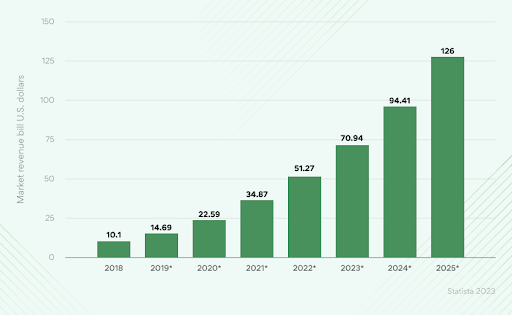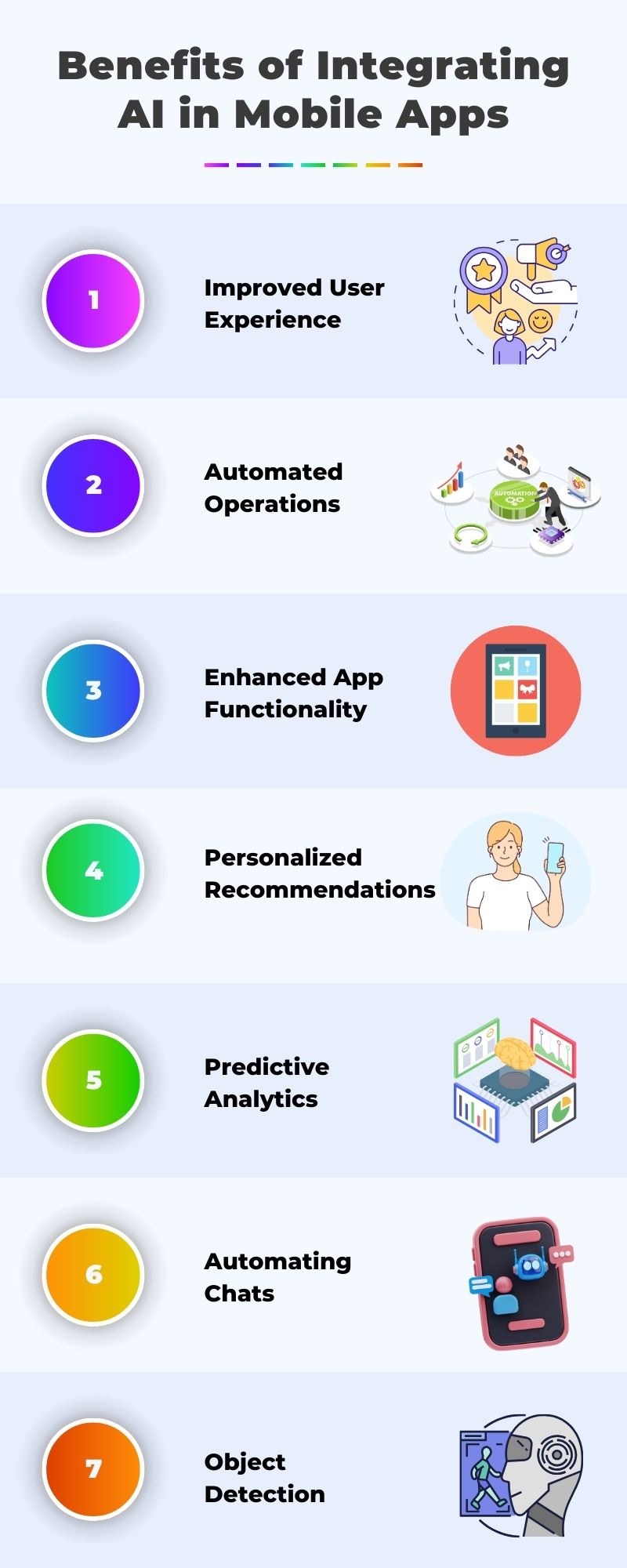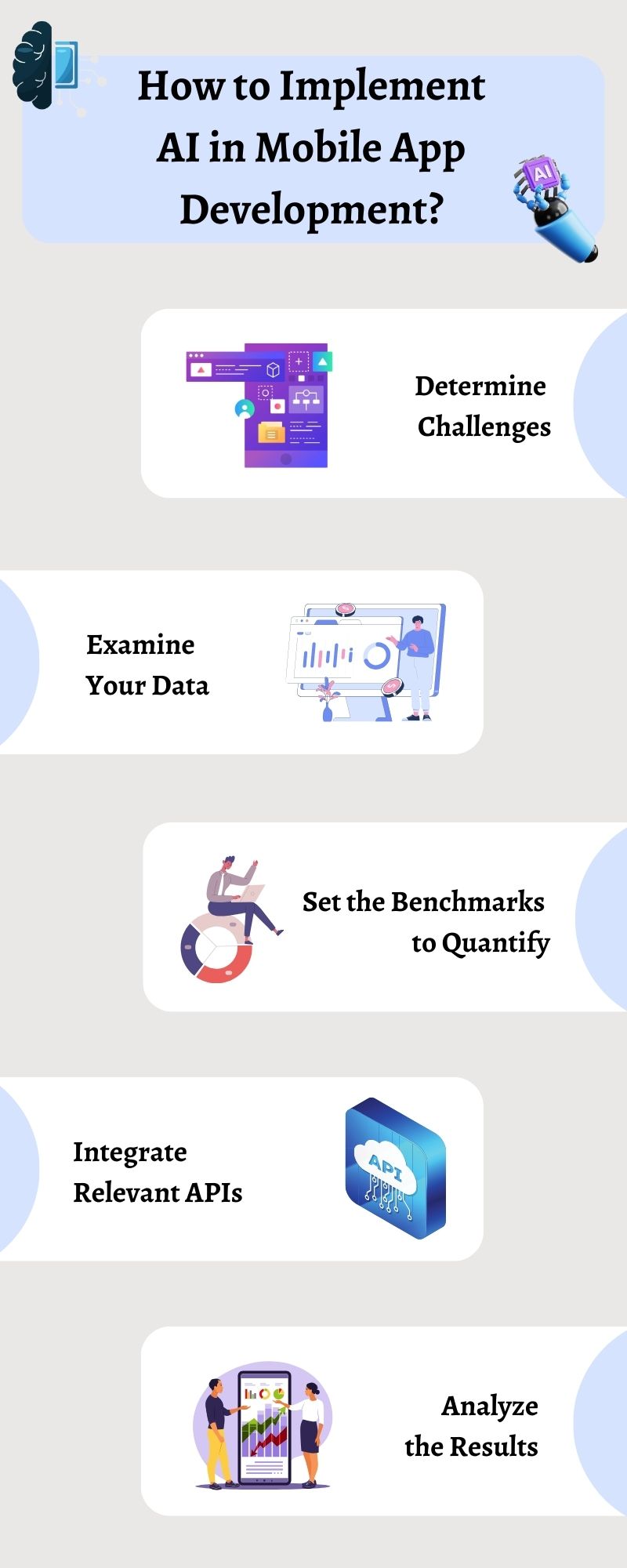Machines have demonstrated a remarkable capability to learn, reason, and make decisions, similar to the human mind. This significant world of technology known as Artificial Intelligence is not just a product of science fiction or futuristic vision. It has become an impressive reality that is revolutionizing the topography of countless industries. But that is merely the tip of the AI iceberg.
In mobile app development, Artificial Intelligence can redefine a said product into a personal shopping assistant, a language expert, or an innovative photographer, all in the blink of an eye. Additionally, AI is getting fair traction from entrepreneurs and business leaders. According to Accenture, 84% of C-suite think they must utilize AI to achieve their business goals. In fact, many leading companies have already started leveraging AI technology to gain a 3x return on investment.
From assisting eCommerce sites like Amazon to creating robust virtual assistants such as Alexa and Humanoid robots like Sophia, the influence of AI in mobile app development is beyond what you might imagine. According to research, the global market value of AI will surpass $126 billion U.S. dollars by 2025.

The above figure showcases the role of Artificial Intelligence in mobile applications. You can build an app with AI that revolutionizes and simplifies human needs. As a trusted artificial intelligence development services provider, our professionals are passionate about exploring the union of AI and mobile applications.
Initial Phases of Mobile Application Development
Earlier, mobile devices were constrained in terms of processing power and capacities. It provided a somewhat limited environment for app developers to work in. Additionally, the labor-intensive development approach involved careful coding and manual testing to ensure compatibility across various mobile devices. And the difficulties were at their highest.
Unattended Inefficiencies in Manual Approach to App Development
- Creating intricate algorithms and codes was one of the many difficulties faced by mobile app developers.
- There were many challenges in scaling and optimizing programs for varying screen sizes and resolutions. Inconsistent user experiences and compatibility problems were the result of this.
- Developing user-friendly interfaces and providing tailored experiences to developers was becoming dated.
Introduction of AI in Mobile App Development
Artificial Intelligence started to permeate the world of mobile app development as technology advanced. This entry opened up game-changing opportunities for companies that own mobile apps and developers. With the advent of AI, developers could build intelligent apps that could learn, adapt, and make judgments based on data, opening up new possibilities.
Using AI in apps, developers can enhance the software functionality by integrating voice recognition, providing personalized recommendations, improving user experiences, and predictive analytics. The capabilities of on-demand mobile app development were revolutionized as a result of this advantage.
Benefits of Integrating AI in Mobile Apps
In mobile app development, it is essential to leverage AI to seize every user interaction and technical event. Integrating AI into mobile apps can produce many advantages, which are mentioned below:

-
Improved User Experience
Mobile application developers can harness AI to elevate user interactions and provide intuitive interfaces and adaptive features. Artificial Intelligence ensures a seamless and delightful app experience.
-
Automated Operations
The implementation of AI helps streamline processes and automate routine tasks. Moreover, it assists in reducing manual efforts, thereby improving overall productivity. AI in mobile app development also enables developers to focus on innovative mobile app ideas and optimization.
-
Enhanced App Functionality
Artificial intelligence augments application abilities by offering advanced features such as natural language processing, ML, and image recognition. It allows for the expansion and versatility of the mobile apps.
-
Personalized Recommendations
AI algorithms also help in analyzing user preferences and the behavior of the customers. It provides tailored content and product suggestions, which increases user loyalty and satisfaction.
-
Predictive Analytics
Mobile applications that are equipped with AI anticipate what users are looking for, trends and probable issues. This assists in proactive adjustments while improving the overall authenticity of the app.
-
Automating Chats
AI-enabled chatbots improve customer support services by resolving queries and delivering immediate assistance. It allows businesses to provide round-the-clock services, thereby enhancing response time.
-
Object Detection
AI-led object detection functionality improves mobile applications with features such as image recognition and augmented reality. This opens up vast opportunities for interactive features like visual elements.
Industry-Specific Use Cases of AI in Software Development
Explore how AI is transforming software development in specific industries. From healthcare diagnostics to finance predictions, discover tailored applications shaping the future of technology in diverse sectors. Here are some substantial AI use cases:
1. AI in Healthcare Apps
Improved machine learning (ML) algorithms, more access to data, and the availability of 5G have increased the use of AI in healthcare industry. Additionally, customer service chatbots provide quick diagnosis, remote monitoring, and improved customer engagement.
AI in medical field assists in Virtual health assistance, like responding to patients for routine health checks, maintaining medical records, scheduling appointments, Health monitoring, Remote medical consultation, etc.
The healthcare sector incorporates massive datasets in its records, which must be handled. A generative AI in healthcare experts gets deep insights into arranged datasets for a correct patient treatment procedure. A medical record management app can easily upload and manage medical records and check medical records in chronological order. For instance, Noom is an AI-based healthcare application that is developed for users interested in living a healthy lifestyle with less body fat.
2. AI in Travel Apps
Travel is one of the world’s biggest sectors and is expected to grow drastically. Travel companies like airlines and hotels utilize AI to forecast customer behaviors (such as flight and hotel cancellations). Overall, AI in travel apps can help in recommendations, booking, itineraries, flying improvements, and forecasting.
3. AI in BFSI Apps
Chatbots, cybersecurity, predictive analytics, risk management, and digital marketing are examples of how AI is being used in BFSI-related mobile apps to enhance both customer relationships and internal operations.
-
AI in Banking
By implementing chatbots into banking applications, banks can make sure they are ready for their customers 24/7. Furthermore, by comprehending customer behavior, AI chatbots can provide customized customer support and reduce the workload on emailing and other aspects.
-
AI in Financial Services
AI in finance can assist in five main areas such as personalized services and products, building opportunities, handling risk and fraud, enabling transparency and compliance, automating operations, and reducing costs.
-
AI in Insurance
It can help businesses assess risk, detect fraud, and minimize human error in the application procedure. AI in the insurance industry could be a great mobile app idea that can enable automation, optimize claims, and develop efficient customer engagement strategies.
Overall, integrating AI into BFSI apps can provide diverse benefits for entrepreneurs, such as cybersecurity and fraud detection, loan and credit decisions, risk management, regulatory compliance, and loan disbursal.
4. AI in Gaming Apps
The influence of AI in game development is abysmal, considerably transforming several gaming factors by making them more interactive, adaptive, and responsive. An AI app development company uses computer vision and ML algorithms to improve different elements of video games, making games more intuitive, personalized, and adaptive to players’ skills.
Let’s see diverse elements where the uses of AI in gaming apps are outstanding-
- Non-Player Characters (NPCs)
- Player Sentiment Analysis
- Image Improvements and AI Upscaling
- Cheat Detection in Multiplayer Games
- Data-Mining and Real-Time Analytics
5. AI in eCommerce Apps
Many businesses are uncovering the importance of AI in assisting them in generating more leads, comprehending their target audience, reducing costs, and increasing output. eCommerce store owners could integrate AI to improve their operations and elevate their visibility in the digital platform. With such innovation, eCommerce sites can provide more value, including— chatbots to answer customer queries, sales forecasting, fake reviews detection and inventory management.
Steps For Integrating AI in Mobile App Development
In general, the procedure of integrating AI in mobile app development can be similar to other software projects. However, it surely carries the subtlety you should consider, ensuring a successful result for your endeavor. Here are the six essential steps you must follow.

1. Determine Challenges
It might be enticing to use AI algorithms to empower all elements of your app. Yet, you have to figure out and prioritize the problems that this technology is going to assist you in solving. This manner, it will provide maximum advantages and enable you to avoid implementing needless and daunting features.
2. Examine Your Data
Before starting AI for application development, you should comprehend where your data will come from and what resources to count upon. You can utilize data analytics tools to regulate your data and prepare it in the most effective way so it can be further assisted in the AI module.
3. Set the Benchmarks to Quantify
Since AI is integrated to enhance some of your procedures, services, or products, you need to set precise objectives and benchmarks to measure in order to analyze how much value your application offers. Having the knowledge of what you wish to gain using artificial intelligence app development will assist you in creating the right functionality.
4. Integrate Relevant APIs
Most probably, your AI-based app will collect data from some other sources or utilize third-party tools. In this scenario, you will encounter the need to integrate APIs or go for custom integration technologies. The more advance and intelligent your application will be, the more likely that APIs will be not enough.
5. Analyze the Results
You want your artificial intelligence in mobile apps to fulfill the previously set objectives or even exceed your expectations. Therefore, you should analyze the metrics and make modifications right away to align the algorithm or any other aspect of the AI component.
How Much Does it Cost to Build an AI App?
The cost of developing AI mobile apps is more than that of developing a conventional mobile app. App developers and a list of the best AI application development companies typically charge based on the project’s scope because artificial intelligence (AI) is a sophisticated technology with many related complexities. An AI app’s price is determined by a number of criteria, including research cost, data cost, and resource cost. To give you an approximate range, the AI app development cost ranges between $50,000 to $200,000.
In addition to this, the following variables affect the AI app development costs.
-
App Complexity
The number of functions added to the mobile app, level of complexities, APIs, app design, app size, etc., increases the AI application cost.
-
Operating System
As a business owner, you have to decide on which OS you want your app to release. Android is compatible with many mobile devices, while iOS is supported on Apple’s devices.
-
Location of the Offshore Agency
The location of the company or team working on your project influences the development costs. The per-hour cost of developers varies in different time zones.
-
Maintenance and Marketing Costs
Maintaining an application requires releasing new updates at regular intervals. And once the app is live, marketing it becomes inherent in driving it to the users, which incurs further expense.
-
Selecting the Business Model
Business type, target users, and services also affect the artificial intelligence app cost.
Additionally, it is imperative to comprehend that the overall cost of mobile app development depends on the industry as well.
Future of Mobile App Development with Artificial Intelligence
Global companies and tech behemoths have already begun using AI in their mobile applications and websites. The next big technological breakthrough will be artificial intelligence (AI), which will likely have an even greater impact than the “Internet.” Thus, get ready to embrace AI in mobile app development, or else you risk falling behind.
Creating an app with AI will open the door to automated procedures, increased productivity and efficiency, and engaging user experiences. With the enormous potential, AI development services may create extremely sophisticated AI applications with premium features like voice assistants and natural language processing. Hire AI app developers from SparxIT to create effective mobile apps that use AI technology and achieve your business objectives.
Conclusion
Implementing AI into mobile app development transforms the landscape, improving user experiences and functionality. From predictive analytics to personalized suggestions, AI helps developers to build smarter, more effective applications.
To ensure you have a thorough knowledge, we have also discussed the costs and timelines associated with developing mobile apps. You can leverage AI’s power to propel your app to new heights and outperform your rivals. Please contact us if you’re looking for a reliable mobile app development company. We have a great deal of expertise in creating apps using AI, machine learning, and IoT technologies.





